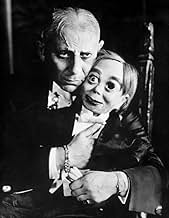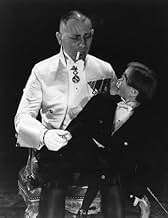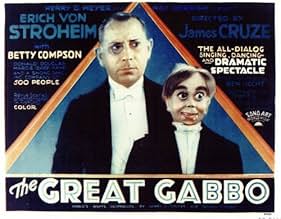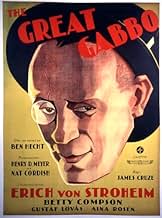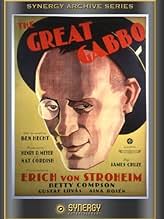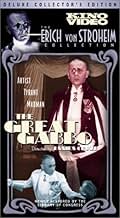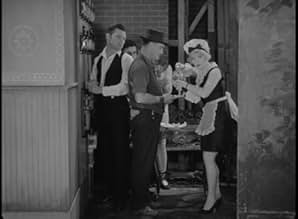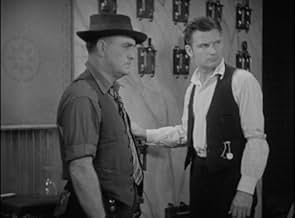CALIFICACIÓN DE IMDb
6.0/10
1.1 k
TU CALIFICACIÓN
Agrega una trama en tu idiomaAn insanely, egocentric ventriloquist, even though he is possessed by his wooden dummy, is in love with a dancer who is in love with another. The dummy gives advice to the ventriloquist.An insanely, egocentric ventriloquist, even though he is possessed by his wooden dummy, is in love with a dancer who is in love with another. The dummy gives advice to the ventriloquist.An insanely, egocentric ventriloquist, even though he is possessed by his wooden dummy, is in love with a dancer who is in love with another. The dummy gives advice to the ventriloquist.
- Dirección
- Guionistas
- Elenco
Erich von Stroheim
- The Great Gabbo
- (as Eric Von Stroheim)
Marjorie Kane
- Babe
- (as Margie 'Babe' Kane)
George Grandee
- Otto
- (voz)
- (sin créditos)
Bo Peep Karlin
- Dancer
- (sin créditos)
Rosina Lawrence
- Dancer
- (sin créditos)
Harry Ross
- Performer
- (sin créditos)
Eddy Waller
- Vaudevillian
- (sin créditos)
Marbeth Wright
- Dancer
- (sin créditos)
- Dirección
- Guionistas
- Todo el elenco y el equipo
- Producción, taquilla y más en IMDbPro
Opiniones destacadas
This film about a ventriloquist who lives a self-imposed life of lonliness because of his personality is absorbing, different, and dated. Shortly produced after The Jazz Singer(1927), the film is an early talkie with all the characteristics of an early talkie. It has somewhat stilted stages, little camera movement, and most annoying, a bunch of Busby Berkley type musical numbers that have little to do with the plot. All that notwithstanding, the lead role of Gabbo, a man who lives to be successful no matter what it takes, who is willing to forsake personal happiness to achieve, who runs the scope of emotions in minutes, is played with gusto by that wonderful actor(and even greater director) Erich Von Stroheim. Von Stroheim uses all his European charm(and decadence) as the man who shares life and lives with and through his dummy Otto. There are no supernatural aspects about the relationship with Gabbo and Otto. The movie is in no way a horror picture(although very often advertised as such). It really is a story of the problems a man has exhibiting his emotions, living with others, and living with himself. Some of the scenes are very well-done, including the last shot as we see Gabbo avoid a ladder. The rest of the cast is effective with Betty Compson as a love interest doing a fine job, and Donald Douglas as a lead singer/romantic figure being absolutely absurd. If for no other reason, see the film to see Von Stroheim in action. There was no one like him.
This is a strange little number because it's a pretty dark subject matter, which at times is pretty chilling to watch, but then they throw in lots of songs. I'm not too sure what the Directors were going for when they filmed this. I say this because it's evident, at times, that quite a few scenes were added later... and I cannot figure out why.
I really like the idea of the mad ventriloquist. In this stories concept, he is in love with his assistant, Mary (Compson), though finds it hard to fully converse with her. As The Great Gabbo (Erich von Stroheim), as he sees himself, he's nasty, offensive, and disagreeable. However, when he speaks through the dummy he can be loving and charming. It's this fissure that eventually leads to his mental breakdown.
I know that the musical moments are there because it's set in the vaudeville and theatre life, though for most of the time these feel more like padding - filling out time. I think this could be remade and be an actually powerful movie. Reduce the musical side and expand on the breakdown. There are times in this movie where chills ran down my spine. The part where Mary walks out on The Great Gabbo and the Dummy calls her softly back, to be reprimanded by Gabbo is both heartbreaking and creepy as hell.
The film, in general, is entertaining, though I have to say I found the number of musical intermissions too much. These are also 1920's musicals so are not so relevant today. Also, the dancing isn't up to par with bigger productions. Though I have to say the scene where Mary throws herself off a giant spiders web to be caught inches from the ground is breathtaking. I would say, for all creepy doll fans and those who like a psychological edge to their dramas, it's worth a watch.
I really like the idea of the mad ventriloquist. In this stories concept, he is in love with his assistant, Mary (Compson), though finds it hard to fully converse with her. As The Great Gabbo (Erich von Stroheim), as he sees himself, he's nasty, offensive, and disagreeable. However, when he speaks through the dummy he can be loving and charming. It's this fissure that eventually leads to his mental breakdown.
I know that the musical moments are there because it's set in the vaudeville and theatre life, though for most of the time these feel more like padding - filling out time. I think this could be remade and be an actually powerful movie. Reduce the musical side and expand on the breakdown. There are times in this movie where chills ran down my spine. The part where Mary walks out on The Great Gabbo and the Dummy calls her softly back, to be reprimanded by Gabbo is both heartbreaking and creepy as hell.
The film, in general, is entertaining, though I have to say I found the number of musical intermissions too much. These are also 1920's musicals so are not so relevant today. Also, the dancing isn't up to par with bigger productions. Though I have to say the scene where Mary throws herself off a giant spiders web to be caught inches from the ground is breathtaking. I would say, for all creepy doll fans and those who like a psychological edge to their dramas, it's worth a watch.
Once again I am dumbfounded at how a great movie can get such a low rating on IMDb. All I can guess is that most of the voters were expecting to see a Gene Kelly-type musical. If this describes you, then leave now. "The Great Gabbo" is about as ANTI-musical as a musical can get. It is a heavy, ponderous, gripping story with more drama than Francis Ford Coppola could ever eke out of a reel of film. It is a compelling and surprisingly complex journey into the mind of a bizarre man.
This is the story of a misunderstood artist whose canvas is a puppet. But whereas the stereotypical story of the misunderstood artist depicts the protagonist as a static character, Gabbo is a highly dynamic individual who keeps us guessing throughout. Is he a good man? Is he a bad man? Is he sane? Is he mad? These questions are not answered until the spectacular & powerful finale, and even then there is much room for speculation.
(As an aside to you Kurosawa fans, the structure of this film is much like Kurosawa's 1952 classic "Ikiru", at times slow but building up to a powerful and unforgettable finish. And the final image deserves its place in the Louvre.)
Regardless of if you're prepared for this type of experience, one thing is for sure: the amazing performance of Erich von Stroheim will burn itself into your mind forever. This film, being one of the early talkies, does not mix much dialogue and music. That is, the spoken scenes are done in silence with no music underneath (much like the 1931 Fritz Lang masterpiece "M"). This means that the actors must carry the entire scene on their shoulders, like in the old days of Shakespearian soliloquies. Erich von Stroheim rises to the challenge in this minimalist setting, and HE DELIVERS. In some scenes he makes you hate him. In others you love him. He can elicit pity as well as admiration. What a roller-coaster ride! Pitted against the heavy drama, the musical numbers seem jarring and incongruous at first. But on further reflection we realize that this emphasizes the bipolar, schizophrenic nature of the subject. Just like Gabbo, a man divided between two worlds, this film divides itself between Broadway musical and psychological thriller. This movie was at least 80 years ahead of its time, if not more.
That's all I'll say because the rest is best experienced as a surprise. This is the best film I've seen in a long time, and the only reason why I'm rating it an 8 instead of a 10 is that, sadly, the original colour scenes were lost, and some of the scenes are in need of restoration on my DVD copy. We can only dream of what it was like to see "The Great Gabbo" as it was originally shown in 1929.
This is the story of a misunderstood artist whose canvas is a puppet. But whereas the stereotypical story of the misunderstood artist depicts the protagonist as a static character, Gabbo is a highly dynamic individual who keeps us guessing throughout. Is he a good man? Is he a bad man? Is he sane? Is he mad? These questions are not answered until the spectacular & powerful finale, and even then there is much room for speculation.
(As an aside to you Kurosawa fans, the structure of this film is much like Kurosawa's 1952 classic "Ikiru", at times slow but building up to a powerful and unforgettable finish. And the final image deserves its place in the Louvre.)
Regardless of if you're prepared for this type of experience, one thing is for sure: the amazing performance of Erich von Stroheim will burn itself into your mind forever. This film, being one of the early talkies, does not mix much dialogue and music. That is, the spoken scenes are done in silence with no music underneath (much like the 1931 Fritz Lang masterpiece "M"). This means that the actors must carry the entire scene on their shoulders, like in the old days of Shakespearian soliloquies. Erich von Stroheim rises to the challenge in this minimalist setting, and HE DELIVERS. In some scenes he makes you hate him. In others you love him. He can elicit pity as well as admiration. What a roller-coaster ride! Pitted against the heavy drama, the musical numbers seem jarring and incongruous at first. But on further reflection we realize that this emphasizes the bipolar, schizophrenic nature of the subject. Just like Gabbo, a man divided between two worlds, this film divides itself between Broadway musical and psychological thriller. This movie was at least 80 years ahead of its time, if not more.
That's all I'll say because the rest is best experienced as a surprise. This is the best film I've seen in a long time, and the only reason why I'm rating it an 8 instead of a 10 is that, sadly, the original colour scenes were lost, and some of the scenes are in need of restoration on my DVD copy. We can only dream of what it was like to see "The Great Gabbo" as it was originally shown in 1929.
If there ever was any schizophrenic example of musicals then that would be 'The Great Gabbo'. This is disturbing psychological drama interrupted by lavish and wonderful dance and music numbers. James Cruze is credited as a director but to be honest most of the non-musical scenes have von Stroheim all written over them. And not only because von Stroheim played in them but there is some sort of very specific psychologically tense atmosphere in them. It is unknown to me how much control von Stroheim had over the production but it is clear (to everyone familiar with von Stroheim's work) that he at least gave some instructions.
The film is much more than just a curiosity - two seemingly different movies, a psychological drama, and a musical tied together. Erich von Stroheim brilliantly plays brilliant ventriloquist Gabbo who is mad or driven mad by his art. When we first meet Gabbo on the screen, we see an unpleasant cruel man who in his egocentrism and perfectionism blames everyone else for his failures. After his lover and partner Mary (Betty Compson) drops the tray in the middle of the performance, he accuses her again. She leaves her but not with a light heart. Pass the two years and they both have worked their way up into Broadway. They meet again when they both appear in the same review show.
The dramatic parts concentrating on Gabbo and his relationships with other people are good but quite poorly developed. Probably because of the forceful inclusion of the musical numbers that do nothing to forward the story or even add anything to it. And this is crystal clear while watching the movie. These would have worked in a lesser amount as just a backdrop for the story. Although, I have to say the musical numbers were interesting to watch but that was the wrong movie for them. The dramatic parts are heavy and the sudden transition into the musical numbers puts the viewer off. Although the musical numbers separately are interesting I found them distracting and thus it made it difficult to follow the story.
Although the movie is inconsistent and didn't quite work, it is still worth watching especially for its uniqueness in the musical category.
The film is much more than just a curiosity - two seemingly different movies, a psychological drama, and a musical tied together. Erich von Stroheim brilliantly plays brilliant ventriloquist Gabbo who is mad or driven mad by his art. When we first meet Gabbo on the screen, we see an unpleasant cruel man who in his egocentrism and perfectionism blames everyone else for his failures. After his lover and partner Mary (Betty Compson) drops the tray in the middle of the performance, he accuses her again. She leaves her but not with a light heart. Pass the two years and they both have worked their way up into Broadway. They meet again when they both appear in the same review show.
The dramatic parts concentrating on Gabbo and his relationships with other people are good but quite poorly developed. Probably because of the forceful inclusion of the musical numbers that do nothing to forward the story or even add anything to it. And this is crystal clear while watching the movie. These would have worked in a lesser amount as just a backdrop for the story. Although, I have to say the musical numbers were interesting to watch but that was the wrong movie for them. The dramatic parts are heavy and the sudden transition into the musical numbers puts the viewer off. Although the musical numbers separately are interesting I found them distracting and thus it made it difficult to follow the story.
Although the movie is inconsistent and didn't quite work, it is still worth watching especially for its uniqueness in the musical category.
The Great Gabbo "The Great Gabbo" is one of the finest examples of American Communist Propaganda films of the early 1900's existent today. It is a master piece of film literature, when you consider the limitations of the technology of the day. Vitaphone, the technology used to cut a vinyl record of the speech or music as the action was filmed, was new and very expensive, and made film editing a nightmarish chore if not impossible.
The script employ's Epic Theater techniques taught by Bertolt Brecht. In this respect it is a thinker's film, the film forces you to think. From the very beginning to the end you are constantly quizzical about behavior, motivation and environment. This is a musical comedy, right? How and why is the title card segment at the beginning of film different from other "musicals". Meet the self-absorbed individualist Gabbo who never acknowledges others who help him gain fame, his ventriloquist dummy Otto, and his stage partner Mary.
We soon realize that Gabbo has very superstitious religious beliefs. While he does not perform a sign of the cross, we know that he operates under the fear of his destined fate from unseen mystical powers. For instance when Mary inadvertently places his hat upon the bed, Gabbo calls Mary a foul name saying "Don't you know that it is bad luck?" Mary, in response, lists a series of activities which might displease and bring about the wrath of an angry immortal. She is more practical stating, "We make our own bad luck." The comparative is the communist environment of the musical theater. Everyone works and does their part for the betterment of the show. Here, once Mary leaves Gabbo, she too climbs to the top and find success in her profession as a singer and dancer with her partner/husband Frank. Gabbo and Mary are both successes in their professions, who then is happier? Who is more honest in their success? Capitalism is treated as an impertinent side note to the values being discussed. Capitalism is the financier management of the show and it seeks gain through investing in both ideals.
The film contrasts individualism versus communism. Many reviews have missed the underpinning effort of the writers and directors to use epic theater, and there blatant agenda to use it to teach the values of communism. They often deride the films production numbers as being unpolished and lacking flair. I ask, how could a film made with the intent to teach communistic ideals express them more eloquently? The ideal of community is not a flawless world, but a world where everyone does what they can to contribute to the whole. Some dancers lag behind the others yet they are there doing there part. Some simply walk from one place to another. The stage is full, busy and the message is understood. The imperfect dance numbers, in the epic theater style, emphasize the communistic ideal not detract from it. Few people would dare be as direct today.
The sad thing about communism's failure is that without community all we have left is individualists who, like Gabbo, are only self-absorbed and care nothing for their neighbor, nor acknowledge supportive people.
This film is a treasure that should be studied over and over. There are so many messages you simply can not absorb them in one viewing.
Watch for Otto's "I'm laughing" song sequence, it is a precursor to Bobby McFerrin's "Don't worry, Be Happy." An interesting comparison is with this film's theater community and with the community environment of Los Angeles in the modern movie "Crash." How are they the same? How are they different? How are messages of these two films different? How are they the same? Think about it.
If you don't own a copy of these films you should. I give "The Great Gabbo" two thumbs up and a black and blue stubbed toe. I guess I'm a little like Maryaccident prone. Oh and have a nice day. Be Happy!
The script employ's Epic Theater techniques taught by Bertolt Brecht. In this respect it is a thinker's film, the film forces you to think. From the very beginning to the end you are constantly quizzical about behavior, motivation and environment. This is a musical comedy, right? How and why is the title card segment at the beginning of film different from other "musicals". Meet the self-absorbed individualist Gabbo who never acknowledges others who help him gain fame, his ventriloquist dummy Otto, and his stage partner Mary.
We soon realize that Gabbo has very superstitious religious beliefs. While he does not perform a sign of the cross, we know that he operates under the fear of his destined fate from unseen mystical powers. For instance when Mary inadvertently places his hat upon the bed, Gabbo calls Mary a foul name saying "Don't you know that it is bad luck?" Mary, in response, lists a series of activities which might displease and bring about the wrath of an angry immortal. She is more practical stating, "We make our own bad luck." The comparative is the communist environment of the musical theater. Everyone works and does their part for the betterment of the show. Here, once Mary leaves Gabbo, she too climbs to the top and find success in her profession as a singer and dancer with her partner/husband Frank. Gabbo and Mary are both successes in their professions, who then is happier? Who is more honest in their success? Capitalism is treated as an impertinent side note to the values being discussed. Capitalism is the financier management of the show and it seeks gain through investing in both ideals.
The film contrasts individualism versus communism. Many reviews have missed the underpinning effort of the writers and directors to use epic theater, and there blatant agenda to use it to teach the values of communism. They often deride the films production numbers as being unpolished and lacking flair. I ask, how could a film made with the intent to teach communistic ideals express them more eloquently? The ideal of community is not a flawless world, but a world where everyone does what they can to contribute to the whole. Some dancers lag behind the others yet they are there doing there part. Some simply walk from one place to another. The stage is full, busy and the message is understood. The imperfect dance numbers, in the epic theater style, emphasize the communistic ideal not detract from it. Few people would dare be as direct today.
The sad thing about communism's failure is that without community all we have left is individualists who, like Gabbo, are only self-absorbed and care nothing for their neighbor, nor acknowledge supportive people.
This film is a treasure that should be studied over and over. There are so many messages you simply can not absorb them in one viewing.
Watch for Otto's "I'm laughing" song sequence, it is a precursor to Bobby McFerrin's "Don't worry, Be Happy." An interesting comparison is with this film's theater community and with the community environment of Los Angeles in the modern movie "Crash." How are they the same? How are they different? How are messages of these two films different? How are they the same? Think about it.
If you don't own a copy of these films you should. I give "The Great Gabbo" two thumbs up and a black and blue stubbed toe. I guess I'm a little like Maryaccident prone. Oh and have a nice day. Be Happy!
¿Sabías que…?
- TriviaThe dummy Otto was a hand carved basswood Frank Marshall figure. The same man who designed Edgar Bergen's famous characters Charlie McCarthy and Mortimer Snerd.
- ErroresOverlooking the seeming impossibility of Gabbo having Otto the Dummy speak while Gabbo is eating, smoking, and drinking, Otto's head and mouth move with the words and music when Gabbo is at least six feet away.
- Versiones alternativasThe Great Gabbo (1929) was originally released by Sono Art-World Wide Pictures, with certain sequences were presented in Multicolor. However, current prints, restored by the Library of Congress and released by Kino International on DVD, exist only in black-and-white. Most, perhaps all, VHS and DVD releases of the film have the color sequences in black and white.
- ConexionesEdited into The Girl from Calgary (1932)
- Bandas sonorasEvery Now and Then
(uncredited)
Written by King Zany and Donald McNamee
Performed by Marjorie Kane and Donald Douglas
Selecciones populares
Inicia sesión para calificar y agrega a la lista de videos para obtener recomendaciones personalizadas
Detalles
- Fecha de lanzamiento
- País de origen
- Idiomas
- También se conoce como
- Great Gabbo
- Locaciones de filmación
- Productora
- Ver más créditos de la compañía en IMDbPro
- Tiempo de ejecución
- 1h 32min(92 min)
- Color
Contribuir a esta página
Sugiere una edición o agrega el contenido que falta

